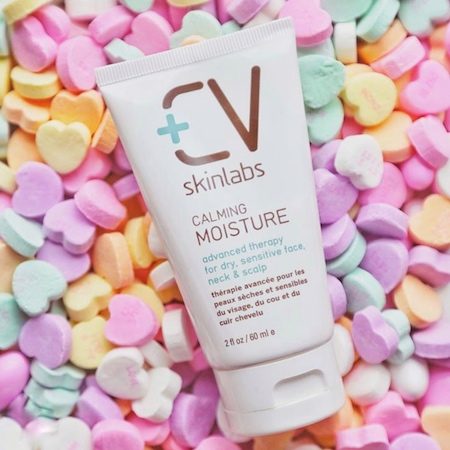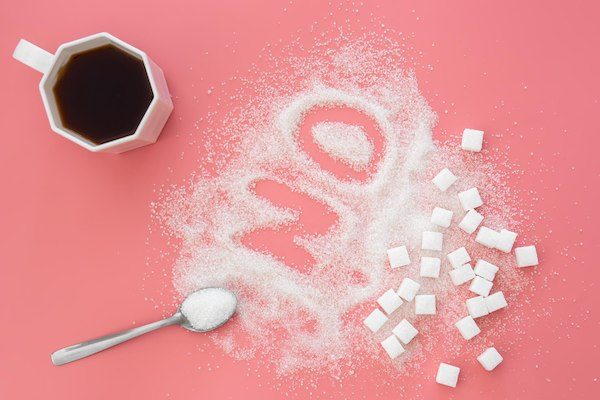Is it time for you to break up with sugar?
If you asked your skin, it would probably say yes!
Your sweet tooth may have a different opinion.
Anyway, this Valentine’s Day, we have a suggestion: How about skipping the chocolate and getting your loved one some clean skincare from CV Skinlabs instead?
He or she would probably enjoy it more because skin care provides longer-lasting benefits than chocolate.
And let’s be honest: too much sugar is not good for your health and your skin. This is why.
Americans consume too much sugar
A little sugar here and there won’t hurt. But on average, Americans eat a lot.
According to the American Heart Association, an average of 17 teaspoons of “added sugar” per day, to be exact (AHA). (Added sugar is added to foods, rather than being naturally part of foods such as fruit.)
This is more than 2-3 times the recommended amount for men and women respectively. The AHA suggests limiting added sugars to no more than 6 percent of calories each day. For most American women, that’s no more than 100 calories per day, or about 6 teaspoons of sugar. For men, it’s 150 calories per day, or about 9 teaspoons.
On the nutrition label you will find ‘added sugars’. It is a separate list from ‘total sugar’, which includes both the natural sugars in the food (such as the natural sugar in milk) and any sugars added afterwards by the manufacturer.
Where does all this sugar come from? You might be surprised. Yes, it’s in sugar-sweetened soft drinks, cookies, cakes and candies, but it’s also in unexpected items like yogurt, soup, bread, cereal and condiments.
When you start reading labels, you realize how ubiquitous sugar is in our daily diets. Cutting costs takes some effort, but it is possible.
Is it worth it?
Why you should break up with sugar
Sugar is not good for your overall health for several reasons.
First, it is “energy dense,” meaning it can easily cause weight gain. Most high-sugar foods, such as sodas, juices and treats, lack other nutrients, such as protein and fiber, so they don’t suppress your hunger as well as healthier foods. That makes it too easy to consume a lot of calories.
Second, a diet high in sugar has been linked to some of today’s most dangerous diseases, including heart disease and type 2 diabetes. Some research even suggests that a diet high in sugary foods may increase the risk of some types of cancer.
In one study overviewResearchers found that in two out of five studies of added sugars, a 60-95 percent increased risk of cancer was observed at higher intakes.
That’s not all. A diet high in sugar can also increase the risk of depression and fatty liver disease.
And if you want to look as young as possible, you should cut down on sugar, as a diet high in sugar can accelerate the skin aging process.
Break up with sugar for the sake of your skin
Research has shown that sugars cause changes in the skin that make us look older.
1. Sugar causes glycation, which leads to wrinkles
Wrinkles are inevitable as we age, but if we eat a lot of sugar, we’re likely to get them earlier in life.
That’s because sugar molecules in the bloodstream can attach to proteins like collagen and elastin, the key building blocks of youthful, smooth skin. Once they attach to these proteins, they can interact with other proteins to form so-called ‘advanced glycation end-products (AGEs)’.
These AGEs then cause protein fibers to become stiff and misshapen. They can no longer perform their normal functions properly and cannot be repaired properly. This means that they can no longer support the structure of the skin.
The result? Increased wrinkles, loss of elasticity, thinning skin and dryness are all hallmarks of aging skin. A Study from 2015 called this the ‘sugar bag’. In a previous studyScientists stated that the process of producing AGEs in all body tissues is accelerated when sugar levels are increased, which affects not only the skin but also the blood vessels, kidneys, eyes and heart.
2. Sugar can cause pimples
If you have acne-prone skin, you have another reason to cut back on sugar, but not just the kind of sugar found in candies and cookies.
Studies have found a link between high glycemic load diets and an increase in acne. Foods high on the glycemic index are broken down more quickly into glucose (a form of sugar), causing blood sugar levels to rise.
With more glucose in the bloodstream, there is more opportunity for that glucose to combine with proteins and create AGEs. People with untreated diabetes-blood sugar levels that are too high – often experience glycation-related complications such as neuropathy (nerve damage) and retinopathy (eye damage).
A high-glycemic diet can also cause inflammation throughout the body, and inflammation is one of the main factors involved in the development of acne.
In a Review 2022 across 34 studies, researchers found that increased daily glycemic load was positively associated with acne and acne severity. Other studies have shown similar results: that consuming more high-glycemic or sugary products was associated with acne.
3. Sugar can increase inflammation
As mentioned above, a diet high in sugar or with a high glycemic load can increase inflammation in the body, and that is bad for your skin in a number of ways.
First, it can increase the risk of acne. Second, it can cause an inflammatory response that worsens skin conditions such as psoriasis and eczema.
Systemic inflammation can also make your skin more sensitive and reactive, causing redness and rashes more often.
Signs you need to break up with sugar
How do you know if you are consuming too much sugar?
Start reading labels and keeping track of how many grams you eat each day. Then check your skin for these signs of sugar damage:
- Prolapse
- Increased appearance of fine lines and wrinkles
- Formation of deep, crevice-like wrinkles
- Drought
- Dullness
- Discoloration and hyperpigmentation
- Increased acne outbreaks
- Slower healing of cuts, scrapes, etc.
And don’t think you’re too young for these effects to occur. According to a study published in the British Journal of DermatologyGlycation usually occurs after age 35 and then “increases rapidly with intrinsic aging.”

How to Cut Back on Sugar
So you’re convinced: it’s time to quit sugar, or at least cut back. Here are some tips to help you with that:
Change how you think about it: We usually associate sweet treats with pleasure and pleasure. Try to reframe your thinking so that you see sugar as a destructive force for your skin and health.
Reading labels: Be conscientious when purchasing soups, bread, yogurt and condiments. Check the label and choose those that contain less or no sugar. For reference, 4 grams of sugar is equal to one teaspoon.
Avoid sugar substitutes: You may think that you only need to choose artificial sweeteners to solve your sugar problems, but research shows that these ingredients can be just as bad, if not worse, for our health. Instead, focus on changing your taste buds and prefer less sweet products.
Rethink breakfast: If you can start your day with less sugar, you will consume less the rest of the day. Avoid sugar-laden processed breakfast cereals and choose healthier items such as oatmeal, eggs, yogurt, fruit and whole-grain toast.
Avoid all sugary drinks: These are one of the biggest factors in a high-sugar diet. Get used to avoiding them completely. Instead, choose water, sparkling water, tea, infused water and coffee.
Redesign dessert: Try some low-sugar options for dessert. Try mixed berries with cinnamon and/or real cream, apples dipped in peanut butter, caffeine-free cappuccino, yogurt with fruit and nuts, and dark chocolate.
Invest in high-quality skin care: While skin care can’t compete with a high-sugar diet, it can help you recover from dieting. While you’re cutting back, try our CV Skinlabs skincare products to improve wound healing, tame inflammation, and boost collagen and elastin production.
Have you tried cutting down on sugar?
Featured image courtesy of Pavel Danilyuk via Pexels.






